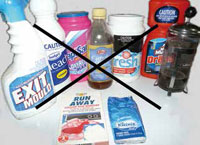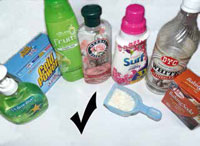If your toilet is blocked or your gully trap or tank is overflowing, contact a registered drainlayer.
The drainlayer will work out what’s wrong and may get and a septic tank cleaner to get the tank pumped out.
If the winter water tables are high, get advice from a drainlayer before your tank is pumped out in case the tank lifts out of the ground when it is emptied.
If you need a new home wastewater system or need to upgrade your system then you need to talk to a site assessor and design person about your options.
See the list of wastewater site assessors.
If you’re unsure, talk to our staff, they can provide advice about what to do with issues with your home wastewater system, how to go about getting a system designed and options for systems.
What is a home wastewater system?
A home wastewater system is simply what takes your dirty water and sewage from your house and treats and disposes of it on the same property.
Whatever type of system you have, the wastes from your kitchen, bathroom, toilet and laundry are taken into a tank where the separation and treatment of solids and liquids occurs.
The liquid effluent is disposed into soils. If your treatment and disposal systems work properly there is little risk the effluent will harm your health or cause environmental pollution.
Guides
For installing, managing and operating a septic system
Do you need a consent?
If you have a home wastewater system that doesn't work well and often overflows from the tanks or the house gully-trap or your soakage system has failed you will need to replace and upgrade parts of your system.
You will need a building consent from Council if you are building a new home or if you are doing building extensions or renovations and you are required to upgrade your existing home wastewater system.
You may also need a resource consent depending on what type of system you choose, what size the property is, and in beach locations – where the system will be sited.
When you are buying a house, it’s important to check with us whether you will need to do specific maintenance and provide information to meet any resource consent conditions.
If you rent a house with a home wastewater system, then you need to take care about the use of detergents and cleaners, and know what sorts of things you shouldn't put into the system like cooking fat, sanitary products and chemicals or paint. You also need to be careful not to overload the system by using a lot of water each day. Check with your landlord, make sure you know who is responsible for septic tank clean outs, any repairs needed and any regular servicing of an Advanced Treatment System.
For more information
Information about installing and maintaining a system, see Residential wastewater systems.
Here's a list of things you should avoid using in your home. Don't put these down any drain or toilet, inside or outside or they will kill the bacterial life in your home wastewater system causing bad odours and the system to not work well.

- nappy soakers and sanitisers
- bleach and whiteners
- disinfectants
- high strength ammonia cleaners
- stain removers
- bulky laundry powders with fillers in big boxes
- excessive grease, cooking oil and fats
- paints, varnishes, paint thinners, petrol, machine oils
- caustic or acid products designed to unblock drains
- unused or old antibiotics or strong medicines
- swimming pool or spa pool back-flush water from the filter system
It’s also important not to put things into the system which can’t break down easily or add bulky solids into the tank – like sanitary pads, tampons, disposable nappies, tissues, condoms, food from garbage grinders and coffee grounds.

- soap
- shampoo and conditioner
- Lux flakes
- concentrated laundry powders (choose ones that state they are safe for use in septic systems)
- liquid laundry cleaners
- baking soda (sprinkle on a sponge and use as a general cleaner, or put 4 Tbsp in 1 litre of warm water and use as a toilet cleaner)
- white vinegar (put 2 Tbsp in a litre of water – use in a spray bottle as a window cleaner)
- Borax – use ½ cup in 4 litres water as a disinfectant. You can buy Borax from a pharmacy.